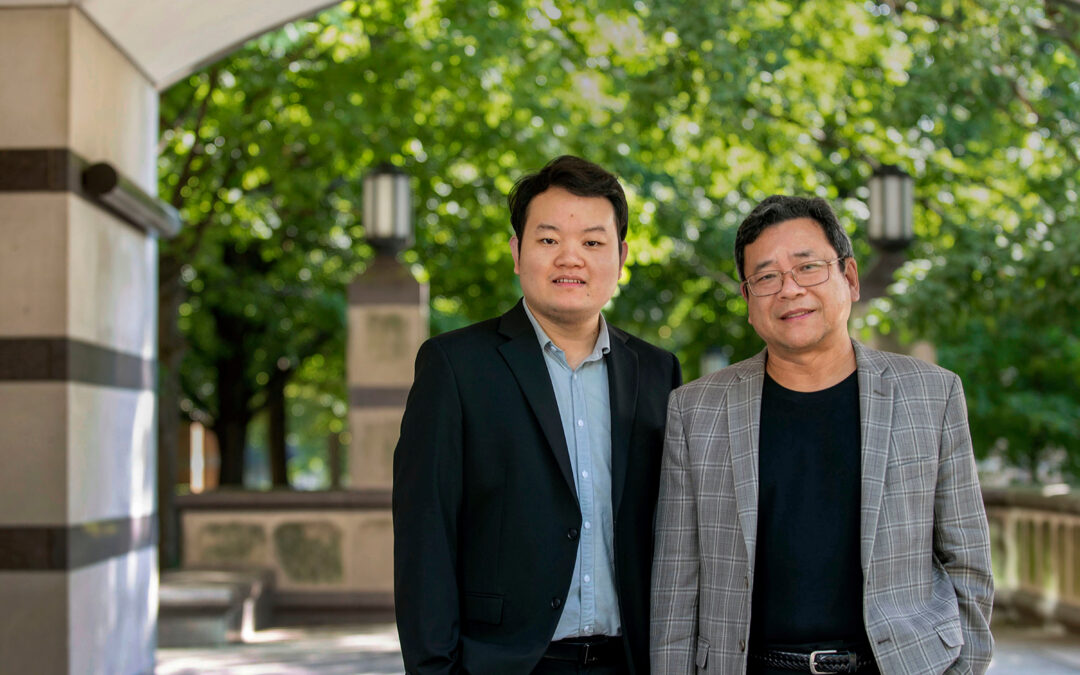Cancer Center at Illinois researchers Hua Wang, left, and Shuming Nie, pictured at Beckman Institute, will take their collaboration in cancer research to the next level with their 2.26 M NCI grant. (Photo by Heather Coit)
Urbana, Ill. – Hua Wang (Ph.D.’16, MatSE), a Materials Science and Engineering assistant professor and CCIL scientist, was recently awarded a Research Project grant from the National Cancer Institute (NCI), which will support the development of type 1 conventional dendritic cells (cDC1) targeted cancer vaccines and cytokine therapies through the integration of immune cell homing materials and metabolic glycan labeling.
Wang, the grant’s principal investigator, said his team will design macroporous materials with independently tunable pore size, mechanics, and chemokine release kinetics; and decipher the role of each parameter on the immune cell homing profile to rationally design materials, which can program immune cells of interest, like cDC1s.
“The cDC1s being recruited to the macroporous materials can then be metabolically labeled with chemical tags via a metabolic glycoengineering process of unnatural sugars, prior to their migration to the lymph nodes,” Wang said, adding that this will allow his team to specifically target tumor immunomodulatory agents to the cDC1s in lymph nodes.
The five-year grant, which comes on the heels of Wang’s lab research receiving a Bridge Grant from the Cancer Center at Illinois, supports his partnership with Shuming Nie, a Grainger Distinguished Chair and Bioengineering professor who is a co-investigator of the NCI grant. Nie is also a professor of Chemistry, Materials Science and Engineering and Electrical and Computer Engineering.
For Wang and Nie, the funding will further their ongoing collaboration to advance cancer research with CCIL, led by Director Rohit Bhargava.
“The combination of world-class basic science and engineering with veterinary oncology models can greatly accelerate research that benefits human health,” Bhargava said. “The CCIL is very pleased to support the exceptional team of Professor Wang and Professor Nie, who will make cancer immunotherapy better.”
Nie, whose interdisciplinary academic research lab works in cancer nanotechnology with a focus on in-vivo cancer imaging and image-guided surgery applications, said the grant will allow his lab to start new projects in biomolecular imaging and immune-engineering.
“This new NCI grant with Dr. Wang has opened opportunities for us in cancer immunotherapy, especially in charactering the microporous materials he developed in using our imaging expertise to help understand the mechanisms of immune cell homing and activation, and in exploring cutting-edge technologies for combining immunotherapy and surgery,” Nie said.
Wang, who credits the CCIL with supporting his research since he began working at The Grainger College of Engineering two years ago, looks forward to working with colleagues to build a new immunology working group within the center. He also hopes to bring together laboratories to explore cancer immunotherapy.
“As a member of CCIL, I am committed to contributing to our cancer research community and pursuing our shared goal of improving human health,” Wang said.
Weishan Huang, assistant professor of immunology at Louisiana State University’s School of Veterinary Medicine, is a second co-investigator of the grant. She will bring her expertise in immunology, especially T cell and dendritic cell biology, according to Wang.
Written by Heather Coit, Grainger College of Engineering.

